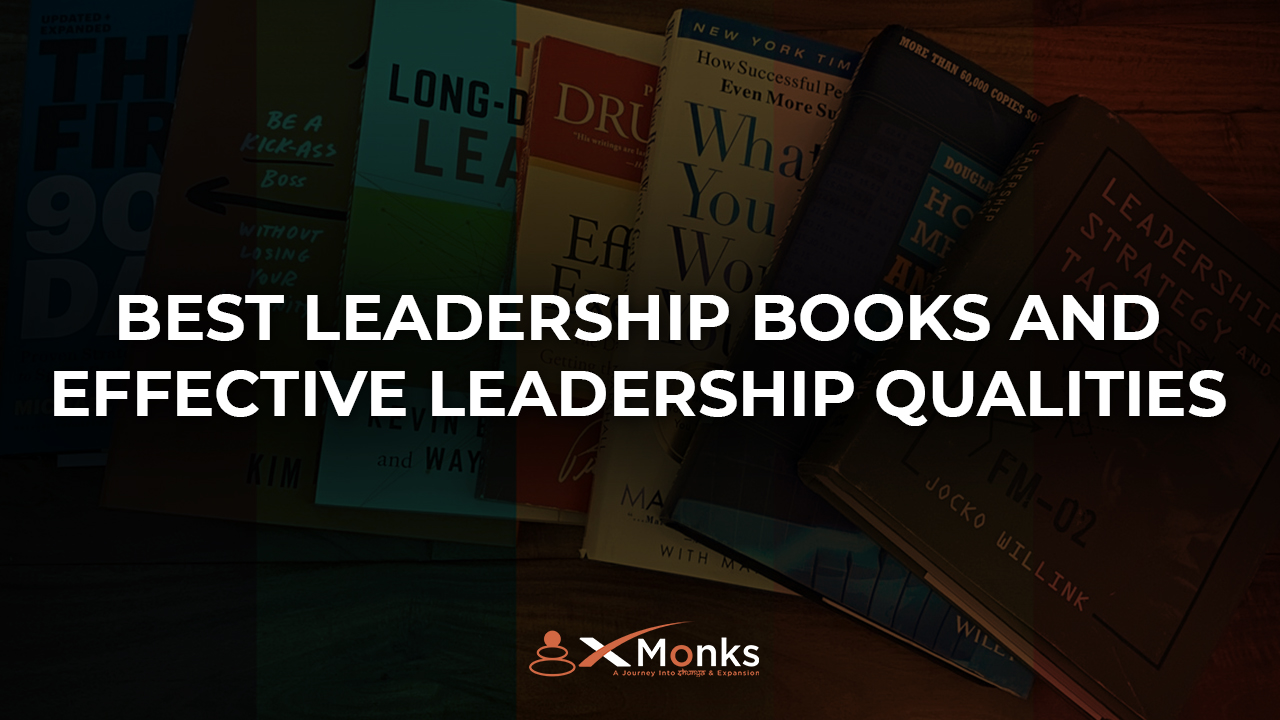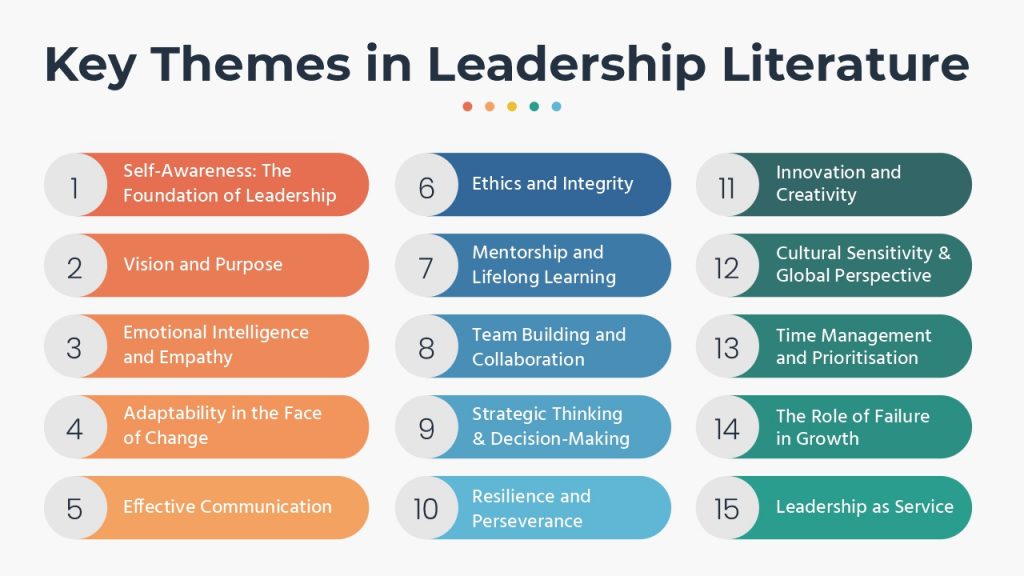Table of Contents
ToggleBest Leadership Books and Effective Leadership Qualities

Leadership is more than a title—it’s a legacy. It requires a blend of vision, courage, empathy, and resilience. But how do we, as aspiring or seasoned leaders, refine these leadership qualities? One of the most effective ways is through reading the best leadership books. These books not only teach strategies but also instill values and inspire change.
As you turn the pages of these works, you uncover the secrets behind effective leadership qualities, giving you the tools to lead with purpose and impact. Let’s explore the transformative power of some of the best leadership books and the traits they help nurture.
The Connection Between Leadership Books and Personal Growth
Leadership books are more than mere collections of words; they are gateways to transformative journeys. These books, often penned by visionaries, distill decades of wisdom into lessons that spark growth, both personal and professional. The best leadership books are akin to mentors, guiding us through the complexities of decision-making, communication, and strategy.
At their core, leadership books encourage self-reflection. They prompt readers to examine their values, strengths, and areas for improvement. This introspection lays the foundation for personal growth, enabling leaders to align their actions with their principles. As readers absorb insights from these works, they begin to recognise patterns in their own behaviors and develop the self-awareness critical to effective leadership qualities.
Furthermore, leadership books often introduce timeless principles. Classics like How to Win Friends and Influence People teach the art of building authentic relationships, a skill vital for personal and professional success. Meanwhile, modern works such as Dare to Lead by Brené Brown emphasise vulnerability and emotional intelligence, leadership qualities that deepen our connections with others.
Through these lessons, readers cultivate resilience and adaptability—key traits of effective leadership qualities. By exploring real-life scenarios and case studies, they gain the tools to navigate challenges with poise and confidence. Some of the best leadership books become catalysts for growth, inspiring individuals to embrace change and strive for continuous improvement.
In a world where change is constant, the lessons found within the pages of leadership books remain steadfast. They not only shape our perspectives but also empower us to lead with empathy, purpose, and vision. Personal growth, as nurtured by these literary treasures, becomes the cornerstone of effective and impactful leadership.
Top 10 Best Leadership Books to Elevate Your Skills
Classic Leadership Must-Reads
- How to Win Friends and Influence People by Dale Carnegie
This timeless gem teaches the art of building meaningful relationships—a cornerstone of leadership. It emphasises understanding human nature and fostering trust, two essential traits for effective leadership. - The 7 Habits of Highly Effective People by Stephen Covey
Covey’s work is a roadmap for personal and professional growth. It focuses on habits like proactivity, prioritisation, and synergy, which are invaluable for leaders striving to inspire teams and achieve long-term goals. - Good to Great by Jim Collins
Collins dives deep into what makes companies and their leaders transcend mediocrity. The concepts of “Level 5 Leadership” and the “Hedgehog Concept” offer invaluable insights into sustainable success. - The Art of War by Sun Tzu
Though ancient, this classic remains a favorite among leaders. Its lessons on strategy, adaptability, and preparation are timelessly relevant in both business and life. - Leadership and Self-Deception by The Arbinger Institute
This book focuses on self-awareness and authenticity, encouraging leaders to break free from ego-driven decisions and embrace empathy and collaboration.
Modern Gems on Leadership
- Leaders Eat Last by Simon Sinek
Sinek explores the biology of leadership and highlights the importance of creating trust within teams. His ideas on servant leadership resonate deeply in today’s collaborative environments. - Dare to Lead by Brené Brown
Brown’s focus on vulnerability and courage challenges traditional notions of leadership. She provides actionable strategies for building trust and leading with authenticity. - Extreme Ownership by Jocko Willink and Leif Babin
Written by former Navy SEALs, this book offers a no-nonsense approach to accountability and decision-making. It teaches leaders to own their outcomes and empower their teams. - Drive by Daniel H. Pink
Pink delves into what truly motivates people, offering insights on how leaders can inspire teams by focusing on autonomy, mastery, and purpose rather than outdated reward systems. - The Infinite Game by Simon Sinek
This book challenges leaders to think long-term and focus on purpose rather than short-term gains. Sinek’s philosophy is a call to lead with sustainability and impact in mind.
Key Themes in Leadership Literature
Leadership literature has long been a beacon for those aspiring to inspire, innovate, and transform. Over decades, the best leadership books have distilled the essence of what it takes to lead effectively, offering readers timeless wisdom and modern insights. These works serve as mirrors, reflecting the values and practices that shape great leaders. Let us journey through the key themes that emerge from this rich tapestry of literature.

Self-Awareness: The Foundation of Leadership
At the heart of leadership lies self-awareness. The ability to understand one’s strengths, weaknesses, and values is a recurring theme in leadership literature. Books like The 7 Habits of Highly Effective People emphasise the need for introspection and personal responsibility. Self-awareness paves the way for authenticity, allowing leaders to connect genuinely with their teams. Without it, the path to cultivating effective leadership qualities becomes a maze of uncertainty.
Vision and Purpose
Leadership is often described as the art of seeing what others cannot. Vision, coupled with purpose, is a hallmark of effective leadership qualities. Simon Sinek’s Start with Why captures this theme beautifully, urging leaders to inspire action by articulating their purpose. Visionary leadership turns abstract ideas into concrete goals, guiding teams toward shared success.
Emotional Intelligence and Empathy
The ability to navigate emotions—both one’s own and others’—is a cornerstone of leadership. Brené Brown’s Dare to Lead explores the power of vulnerability and empathy in fostering trust and collaboration. These leadership qualities deepen relationships and create environments where individuals feel valued. Emotional intelligence transforms leaders into pillars of support, ensuring stability even in turbulent times.
Adaptability in the Face of Change
Change is the only constant, and leadership literature often highlights the need for adaptability. Some of the best leadership books like Who Moved My Cheese? underscore the importance of resilience and agility in navigating change. Leaders who embrace adaptability can turn challenges into opportunities, setting examples for their teams to follow.
Effective Communication
Words wield power, and the best leadership books emphasise the art of communication. Dale Carnegie’s How to Win Friends and Influence People remains a timeless guide to building rapport and fostering collaboration. Clear, empathetic communication bridges gaps and aligns teams with a shared purpose, fostering a culture of mutual respect and understanding.
Ethics and Integrity
Leadership without integrity is like a ship without a compass. Ethical decision-making is a recurring theme in leadership literature, urging leaders to uphold principles even in the face of adversity. Works like Good to Great by Jim Collins highlight the importance of humility and moral courage, inspiring readers to lead with honor.
Mentorship and Lifelong Learning
The journey of leadership is one of perpetual growth. The best leadership books often emphasise the importance of mentorship and continuous learning. Leaders Eat Last by Simon Sinek explores the value of putting others first, cultivating environments where mentorship thrives. These lessons remind leaders that growth is both a personal and collective endeavor.
Team Building and Collaboration
Leadership is never a solo act; it thrives on teamwork. Literature on leadership often stresses the importance of building cohesive teams. Patrick Lencioni’s The Five Dysfunctions of a Team offers insights into overcoming challenges and fostering trust within groups. Effective leadership qualities, such as collaboration and inclusivity, are vital in transforming individuals into unified forces.
Strategic Thinking and Decision-Making
A leader’s ability to think strategically and make sound decisions is central to their success. Some of the best leadership books like The Art of War offer timeless strategies for navigating complex scenarios. Strategic thinking enables leaders to anticipate challenges and seize opportunities, ensuring long-term success.
Resilience and Perseverance
Resilience is a recurring theme in leadership literature, emphasising the importance of perseverance in the face of adversity. Extreme Ownership by Jocko Willink and Leif Babin teaches leaders to take accountability and lead by example. Resilient leaders inspire their teams to weather storms and emerge stronger.
Innovation and Creativity
Leadership literature celebrates the courage to think differently. Leadership books like Blue Ocean Strategy highlight the value of innovation in creating new opportunities. Leaders who foster creativity drive progress, inspiring their teams to envision possibilities beyond the status quo.
Cultural Sensitivity and Global Perspective
In an increasingly interconnected world, cultural sensitivity has become a key theme in leadership literature. Books like The Culture Map by Erin Meyer offer insights into navigating cross-cultural dynamics. Understanding diverse perspectives enhances collaboration and broadens the scope of leadership.
Time Management and Prioritisation
The best leadership books often address the challenge of balancing responsibilities. Stephen Covey’s First Things First emphasises prioritisation and aligning actions with values. Effective leaders manage their time wisely, ensuring that their efforts are focused on what truly matters.
The Role of Failure in Growth
Failure is not the end but a stepping stone to success. Leadership literature frequently highlights the lessons embedded in setbacks. Books like Failing Forward by John C. Maxwell teach leaders to embrace failure as an opportunity for learning and growth.
Leadership as Service
Perhaps the most profound theme in leadership literature is the idea of servant leadership. Works like The Servant as Leader by Robert Greenleaf inspire leaders to prioritise the needs of others. This approach fosters loyalty and trust, creating environments where teams flourish.
In conclusion, leadership literature offers a treasure trove of insights for those seeking to lead with purpose and impact. By exploring the key themes within these works, readers can cultivate effective leadership qualities and unlock their potential. The best leadership books are not just manuals but companions on a transformative journey, guiding leaders toward excellence.
Effective Leadership Qualities: Lessons from Books
Effective leadership qualities are often the result of deliberate cultivation, and books play a pivotal role in this process. The best leadership books offer a treasure trove of insights, shaping individuals into leaders who inspire and innovate. These qualities—communication, empathy, and resilience—are not innate but are nurtured through exposure to diverse perspectives and timeless principles.
Leadership books emphasise the importance of communication, a skill that underpins every interaction. Dale Carnegie’s How to Win Friends and Influence People highlights the value of listening and understanding others. Leaders who master this art foster trust and collaboration within their teams, creating environments where innovation thrives.
Empathy, another cornerstone of effective leadership qualities, is championed in Brené Brown’s Dare to Lead. By embracing vulnerability, leaders can connect with their teams on a human level, building relationships rooted in trust and mutual respect. This emotional intelligence enhances decision-making and conflict resolution, ensuring that leaders navigate challenges with grace.
Resilience, as highlighted in Extreme Ownership by Jocko Willink and Leif Babin, teaches leaders to embrace accountability and persevere through adversity. Such lessons prepare leaders to face uncertainties with courage, transforming obstacles into opportunities for growth.
Moreover, leadership books inspire strategic thinking. Jim Collins’ Good to Great introduces the concept of Level 5 Leadership, encouraging humility and determination. By combining these traits, leaders can steer their organisations toward sustainable success.
Ultimately, the lessons gleaned from leadership books become guiding lights, shaping individuals into dynamic leaders. These books provide frameworks for understanding and developing the qualities that inspire trust, drive innovation, and ensure enduring success. The journey through these pages is a testament to the transformative power of knowledge and the enduring impact of effective leadership.
Why Reading Cultivates Leadership Qualities
Reading is more than a pastime; it is a transformative practice that shapes minds and refines character. For aspiring leaders, delving into the best leadership books is an essential step toward cultivating effective leadership qualities. These books serve as compasses, guiding individuals through the complexities of leadership with wisdom and inspiration.
At its core, reading fosters self-awareness. Leadership books encourage introspection, prompting readers to evaluate their values, behaviors, and decision-making processes. This self-awareness forms the foundation of effective leadership, allowing individuals to lead with authenticity and integrity.
Leadership books also expand perspectives, exposing readers to diverse ideas and experiences. By exploring works like Good to Great or The Infinite Game, leaders gain insights into long-term thinking and sustainable success. Such perspectives inspire innovation and adaptability, enabling leaders to navigate an ever-changing landscape.
Furthermore, reading enhances communication skills. By immersing in narratives and arguments, readers develop a nuanced understanding of language and expression. Books like How to Win Friends and Influence People provide practical techniques for fostering connections and building trust, essential traits of effective leadership qualities.
Leadership books also instill resilience. Stories of triumph over adversity, as shared in Extreme Ownership, teach leaders to embrace challenges with courage and determination. These lessons equip leaders to face setbacks head-on, transforming obstacles into stepping stones for growth.
The act of reading itself cultivates patience and focus, qualities integral to effective leadership. As leaders engage with complex ideas and reflect on their applications, they develop the ability to think critically and make informed decisions.
To see the big picture, reading is an investment in personal and professional growth. Each page turned is a step closer to becoming a leader who inspires and empowers. Through the lessons imparted by leadership books, individuals unlock their potential, embodying the qualities that define true and impactful leadership.
How to Choose the Right Leadership Book
In a sea of literature, choosing the right leadership book can feel like a daunting task. With countless titles vying for attention, finding one that aligns with your unique goals and challenges is crucial. The best leadership books not only resonate personally but also offer actionable insights that refine effective leadership qualities.
The first step in selecting a leadership book is to identify your current needs. Are you seeking to enhance your communication skills, develop strategic thinking, or cultivate emotional intelligence? Books like How to Win Friends and Influence People are excellent for those looking to improve interpersonal relationships, while The Art of War provides timeless strategies for navigating competitive environments.
Another consideration is the author’s expertise and perspective. Look for leadership books written by thought leaders or individuals with proven track records in leadership. Titles such as Leaders Eat Last by Simon Sinek or Drive by Daniel H. Pink offer unique insights into motivation and team dynamics, ensuring that the lessons are both practical and inspiring.
Reading reviews and recommendations can also guide your choice. Insights from other readers often highlight the strengths and weaknesses of a book, helping you determine if it aligns with your objectives. Additionally, exploring summaries or sample chapters can provide a glimpse into the author’s approach and tone.
Consider the format as well. Some readers may prefer concise, action-oriented books like Extreme Ownership, while others might gravitate toward reflective and philosophical works like Dare to Lead. Aligning the book’s style with your learning preferences enhances the reading experience.
Lastly, be open to exploring both classics and contemporary works. While timeless leadership books like The 7 Habits of Highly Effective People offer foundational principles, modern titles address current challenges and evolving leadership paradigms.
Choosing the right leadership book is a personal journey, one that bridges your aspirations with the wisdom of great minds. By selecting a book that speaks to your needs, you embark on a path of growth, equipping yourself with the tools to lead with confidence and purpose.
FAQs
Conclusion
Leadership is both an art and a science, a delicate balance of vision, empathy, and resilience. The best leadership books are more than guides—they’re companions on this journey, offering wisdom and inspiration at every step. As you explore these works, you’ll find the tools to refine your skills, nurture effective leadership qualities, and lead with purpose.

